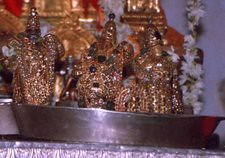Vada Vadi Partivadi – Refutation of Charvak
• The person who puts forth the first statement or concept or accusation is known as Vadi.
• One who defends himself from accusation or protects his own logic is Prativadi
• There are actually four types of discussions –
• samvaada,
• vaada,
• jalp and
• vitanDa.
• samvaada is the discussion between the teacher and the taught as is shree krishna-arujuna samvaada. The student does not question the teacher but questions his understanding for clarification. This type of discussion can occur only when the student surrenders himself completely at the feet of the teacher.
• Vaada – is the discussion between two equals for mutual enhancement of knowledge – the purpose is to settle what the truth is. Both come to the table for discussion with an open mind and the discussion is based on some accepted pramaaNa -of the authority –
• Jalpa is where each debater comes to the table with preconceived notion that he is right and the other fellow is wrong. The other fellow also comes with the same notion. The purpose of the discussion is only to conver the other fellow to his camp. There is no knowledge that takes place in these discussions. Even if one is loosing his arguments, he only goes and comes back with more ammunition to defend himself. Only lot of noise. But those who are bystander can learn the defect in each of their arguments and they can learn out of these discussions.
• Vitanda – is some what peculiar. In these discussions one is ready to take up the other fellows arguments, which he himself does not believe in, but argues against the other fellow just to prove that he is wrong. This is also accepted arguments and is used very effectively to prove there is no credibility for the opponent. You are wrong, not because the statement by itself is wrong but it is wrong because you made that statement.
• When Benefics are in eleventh like Jupiter venus or mercury or if sun is in 11th then Prativadi wins the debate. Or the one who opens the debate looses.
• When these planets are in 10th then Vadi wins.
• When one opens the debate in an ascendant ,the 4th from which happens to be fiery sign , the opponent runs away
• If sun tenants lagna or 10th house or benefics occupy them there will be increase of knowledge .jupiter increases knowledge venus poetic skills and mercury communication skills.
• In 10th a benefic will spread knowledge.
Madhvacharya has written an exclusive grantha “ Katha Laxan “ explaining the various forms of debates and methods to tackle them and types of proof to present to uphold VEDAS.
Here is sample debate Of Acharya with a Charvak .
A charvak is an atheist . [ Charu- sweet Vak- speech ] [ I would term it as Kshar vak ]
A charvak was a Brahmin who believed only in perception . Acquiring of Knowledge through sense perception alone. He refutes inference and Vedas or textual scriptures as not reliable in matters of knowledge.
A charvak is modern theory of materialism ; Yesterday has gone by , Tomorrow is not yet seen , SO live in the present and enjoy. Enjoy and celebrate your senses even if you have to borrow money , without adhering to any dharma or bindings.
Out of the aphorisms of Brihaspati came a whole school of Hindu materialists, named, after one of them, Charvakas. They laughed at the notion that the Vedas were divinely revealed truth; truth, they argued, can never be known, except through the senses. Even reason is not to be trusted, for every inference depends for its validity not only upon accurate observation and correct reasoning, but also upon the assumption that the future will behave like the past.
One may ask why there are so many philosophies in the world, why the debates and why cant only one dharma prevail. Why?
The answer is
1) dourlabhyaat shuddha-buddheenaam [due to lack of pure intellect]
2) baahulyaat alpavedinaam [due to lot of ignorant people]
3) duraagraha-gRuheetatvaat [due to prejudices]
4) vartante samayaaH sadaa || [all faiths remain for ever]
The discussion goes thus:
Charvak: I believe in only sense perception .
Madhvacharya: How did you come to know about your belief!
Charvak: No answer! [Belief is not perceived by any senses]
Charvak proclaim only eyes etc senses [jnanendriya] are true. This statement is self contradictory. Here if one relies purely on the senses for knowledge then one is denying the self and its existence as the one who is actually gaining the knowledge.
This self is not visible or heard.
We say” this is my hand “this is my body “, the word my is indicative and is inferred by someone inside as neither hand nor the body that is seen or heard is “me”.
The self contradictory [vyahatha bhasha] is imperative in Charvak’s words. What is vyahatha?
It is akin to saying “My mother is a barren woman”
The sentence itself shows it is wrong and contradictory.
If the mother was barren how did she become a mother!!!!!
If a charvak is teaching his student his philosophy, how can he deduct that student has learnt his philosophy, by facial expression? He will have to somewhere infer it.
So inference has to be accepted by Charvakas.
Third is the textual proof. Charvak says it cannot be believed.
What people say what Vedas say, what religion says need not be true
.
Let us ask a Charvak what day is today?
Charvak says it is Thursday!
How did he come to know that?
Either he will have to refer a calendar for that and
Accept the text written “Today is Thursday”
So Charvak is accepting Textual proof as well.
Let us also give him “sentences -Text is not acceptable”
Charvak if he says he does not accept
then he is accepting that Text is acceptable !
If he says yes text is not acceptable
then he is accepting the given sentence as proof !
Thus beyond doubt Charvak becomes a vyahatha Bhashi.
Vedvyasa in Brahma sutra refutes Charvak matha by following aphorism
|| Om abyugamepi arthaabavaath Om ||
• Philosophy is meant to increase happiness.
• Happiness more than what we presently have.
• Philosophy is meant to reduce miseries in present birth and freedom from misery forever.
• If philosophy does not say what to do and what not to do , the it is of no use
• The perception and relying solely on it is form of self denial and existence
• It is akin to ignoring self
• So such philosophy should be discarded.
Krishnarpanamastu




Notes & comments